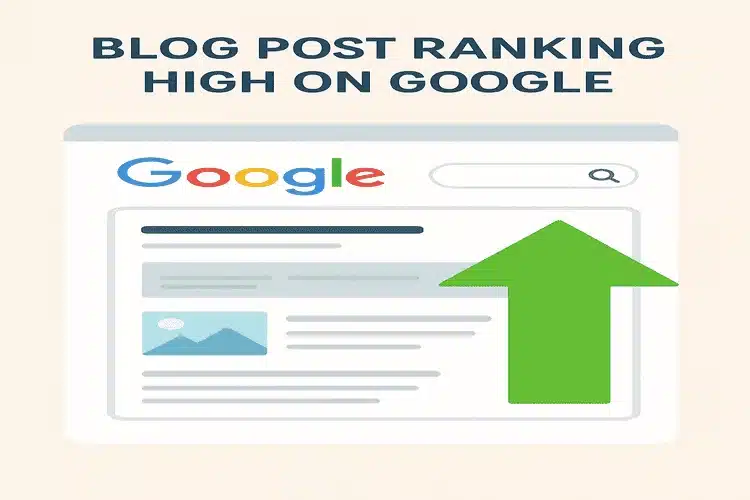
Introduction
Ever poured your heart into a blog post, hit publish? You check Google, and your post is buried on page 10. Ouch. I’ve been there. A few years back, I started a travel blog, jazzed to share my adventures. I thought great stories would automatically pull readers in. Nope. My posts were invisible, and I was gutted. After some late-night research and trial-and-error, I cracked the code to climb Google’s rankings. Now, my blog’s on page one for some juicy keywords, and I’m here to share the secrets.
This guide is all about how to boost blog ranking in Google. It’s not an overnight fix think slow-cooked BBQ, not fast food. With these practical tips, you’ll nudge your blog closer to that coveted first page. Whether you’re a newbie or a seasoned blogger, these strategies will help you shine. Let’s dive in!
What Does Blog Ranking in Google Mean?
Blog ranking is where your posts land in Google’s search results. Higher up means more clicks, more readers, and more love for your blog. It’s Google’s way of saying, “Hey, this content’s worth checking out!”
Google uses a complex algorithm think of it as a super-picky librarian to decide rankings. It looks at relevance, quality, and user experience. A top spot usually means your blog nails these. For mobile and Windows users, it’s about creating content that’s easy to find and read, whether on a phone or laptop.
My travel blog? It tanked at first because I ignored SEO basics. Once I learned what Google wanted, my posts started climbing. It’s like giving the librarian exactly the book she’s looking for.
Why Boosting Blog Ranking Matters
Reaching the first page of Google is revolutionary. About 75% of clicks go to the top five results, and most people don’t scroll past page one. 10. Increased traffic from higher rankings can result in sales, subscribers, or ad revenue.
It’s all about visibility for bloggers. Even if you have amazing content, it would be like whispering in a storm if it was on page 10. Additionally, a high ranking increases readers’ trust because they perceive you as authentic. It also raises spirits. It was like winning a marathon to watch my blog go from nothing to page one.
Whether you blog for pleasure or for financial gain, improving your ranking reduces stress and time. In the crowded digital world, it’s your ticket to visibility.
How to Boost Your Blog Ranking in Google
Ready to make Google love your blog? Here’s a step-by-step guide to improve Google search ranking for blogs. These tips are practical, tested, and beginner-friendly. Let’s go!
- Look up and employ keywords that are optimized for search engines: Use tools like Ubersuggest or Google Keyword Planner to find the keywords that people are searching for. Your title, headings, and body should all contain your primary keyword, such as “how to boost blog ranking.” Aim for natural flow rather than going overboard. Because I used random words instead of what people were searching for, my first blog failed.
- Optimize Images with Keywords: Add descriptive alt text to images, like “blog ranking tips infographic.” It helps Google understand your visuals, boosting SEO. I missed this early on, and my traffic suffered.
- Craft Click-Worthy Titles: Write concise, catchy titles that hint at your post’s value. For example, “10 Proven Tips to Skyrocket Your Blog’s Google Ranking” grabs attention better than “Blog Tips.” Make it clear, not vague.
- Submit to Directories: List your blog on reputable directories like Blogarama or AllTop. It builds backlinks, which Google loves. I got a traffic bump after submitting to niche travel directories.
- Enable Guest Comments: Let anyone comment on your posts no sign-up required. It sparks engagement, which Google sees as a quality signal. Restricting comments cost me reader trust early on.
- Create Original Content: Write unique, valuable posts. Copying others gets you penalized by Google. My early posts were too “inspired” by others big mistake.
- Optimize for Mobile: Use responsive themes and short paragraphs. Over 50% of searches are mobile. 15 My blog’s bounce rate dropped after I fixed mobile glitches.
- Build Quality Backlinks: Guest post on relevant blogs or join forums. Links from trusted sites boost authority. I landed a guest post on a travel site, and my rankings soared.
- Use Internal Linking: Link to your own posts within your blog. It keeps readers engaged and helps Google crawl your site. Simple, but I overlooked it at first.
- Post Consistently: Publish weekly or biweekly. Regular updates signal freshness to Google. My sporadic posting hurt my early rankings.
- Optimize Site Speed: Use tools like GTmetrix to cut load times. Fast sites rank better. My blog used to load like molasses fixing it was a game-changer.
- Leverage Social Media: Share posts on X, Pinterest, or Reddit. Social signals can indirectly boost SEO. My Pinterest pins drove surprising traffic.
- Use Meta Descriptions: Write 150-character blurbs with keywords like “SEO tips for blog ranking.” They entice clicks from search results.
- Engage with Analytics: Check Google Analytics for what’s working. I found my best posts by digging into data, not guessing.
- Target Featured Snippets: Answer questions directly in posts with bullet lists or tables. It’s how I snagged a “position zero” spot once.
Start small pick a few tips and tweak as you go. It’s like planting seeds; give them time to grow.
Common Mistakes & How to Avoid Them
We all trip up sometimes. Here’s a rundown of blogging blunders that tank your ranking and how to dodge them.
- Keyword Stuffing: Cramming keywords like “blog ranking” everywhere looks spammy. Use them naturally, 2-3 times per post. I overdid it once and got slapped by Google.
- Ignoring Mobile Users: A clunky mobile site drives readers away. Test your blog on your phone. Fix issues with free tools like Google’s Mobile-Friendly Test. 15
- Copying Content: Stealing posts kills your ranking. Google hides duplicates. Write fresh ideas or spin things your way. Learned this the hard way.
- Neglecting Backlinks: No links from other sites? You’re invisible. Reach out for guest posts or comment on relevant blogs. It’s like networking for your site.
- Slow Site Speed: If your blog takes ages to load, users bounce. Compress images and ditch heavy plugins. My site’s speed doubled after a cleanup.
- Ignoring Analytics: Flying blind without data is dumb. Use Google Search Console to spot weak posts. It’s like a GPS for your blog.
- Inconsistent Posting: Random updates confuse Google. Stick to a schedule, even if it’s monthly. My early chaos cost me traffic.
Avoid these, and you’re halfway to Google’s good side. It’s all about keeping it real and user-focused.
Best Tools for Boosting Blog Ranking
Tools can make or break your SEO game. Here’s a comparison of top ones to improve Google search ranking for blogs.
| Tool | What It Does | Pros | Cons |
|---|---|---|---|
| Yoast SEO | WordPress plugin for on-page SEO. | Easy keyword optimization Readability checks Free version solid | Premium is pricey WordPress only |
| Google Keyword Planner | Finds search volume for keywords. | Free with Google Ads Accurate data Great for beginners | Needs Ads account Basic interface |
| Ubersuggest | Keyword and competitor analysis. | Free features galore Backlink insights User-friendly | Limited free searches Less precise than paid |
| GTmetrix | Checks site speed and performance. | Detailed speed reports Free tier enough Fix suggestions | Slow for free users Techy for newbies |
| Ahrefs Webmaster Tools | Free backlink and SEO audit tool. | Finds broken links Free for site owners Deep insights | Limited free version Learning curve |
Yoast is a must for WordPress users; Ubersuggest is great for keyword newbies. I use GTmetrix weekly to keep my site zippy. 18
People Also Ask (PAA)
How long to rank on Google’s first page? Usually 3-6 months with consistent effort.
What’s the best SEO tool for beginners? Yoast SEO for WordPress or Ubersuggest for general use.
Do comments help rankings? Yes, they boost engagement, a Google ranking factor.
Can social media improve SEO? Indirectly, by driving traffic and shares. 13
Why is my blog not ranking? Could be poor keywords, slow site, or low-quality content.
How many keywords per post? 2-3 main ones, plus related terms, used naturally.
Are backlinks still important? Yep, they signal authority to Google. 12
Frequently Asked Questions (FAQ)
1. How do I find the right keywords? Use Google Keyword Planner or Ubersuggest. Look for terms with decent search volume but low competition. I found “travel tips” gold by targeting niche phrases like “solo travel packing.”
2. Does mobile optimization really matter? Big time. Over half of searches are mobile. A clunky site means users leave fast, and Google notices. Test with Google’s Mobile-Friendly tool to stay sharp. 15
3. What’s a good posting schedule? Weekly or biweekly works. Consistency tells Google your site’s active. I post every Wednesday, and my traffic’s steadier now.
4. How do I get backlinks? Write guest posts, comment on relevant blogs, or share on X. I got a link from a travel forum that sent my ranking up a notch.
5. Why avoid keyword stuffing? It makes posts read like robot spam. Google might penalize you. Stick to natural use—my early stuffed posts tanked for this reason.
6. How do I track my ranking progress? Google Search Console shows keyword ranks and clicks. Check monthly to spot trends. It’s how I saw my blog climb for “budget travel hacks.”
7. Are free SEO tools enough? Often, yes. Yoast and Ubersuggest cover basics. Paid tools like Ahrefs add depth but aren’t must-haves for starters.
Conclusion
It takes strategy and perseverance to move up Google’s ranks. These Google blog ranking tips are your road map, covering everything from mobile adjustments to keywords. By following these guidelines, my travel blog went from zero to page one. You can, too.
Key wins: Post original content frequently, use SEO-friendly keywords, and maintain a fast website. Engage your readers and avoid copying and stuffing.
Are you prepared to shine? Choose three suggestions, such as comments, mobile optimization, and keywords, and get started right away. Have any queries or victories to share? Please leave a comment; I’m listening!
Note: Last but not the least you should have original content posted on your blog, don not copy anything from any other blog this will not improve your ranking in fact your blog will not able to appear on google page because google omit duplicate search result.
